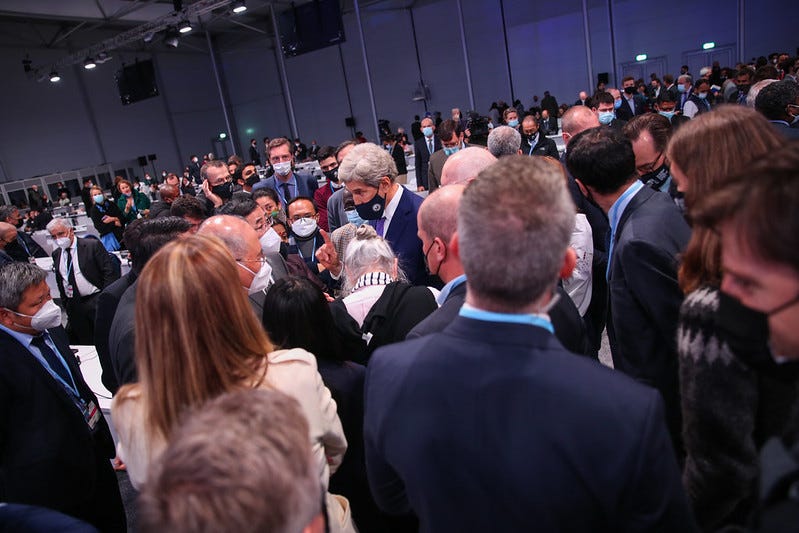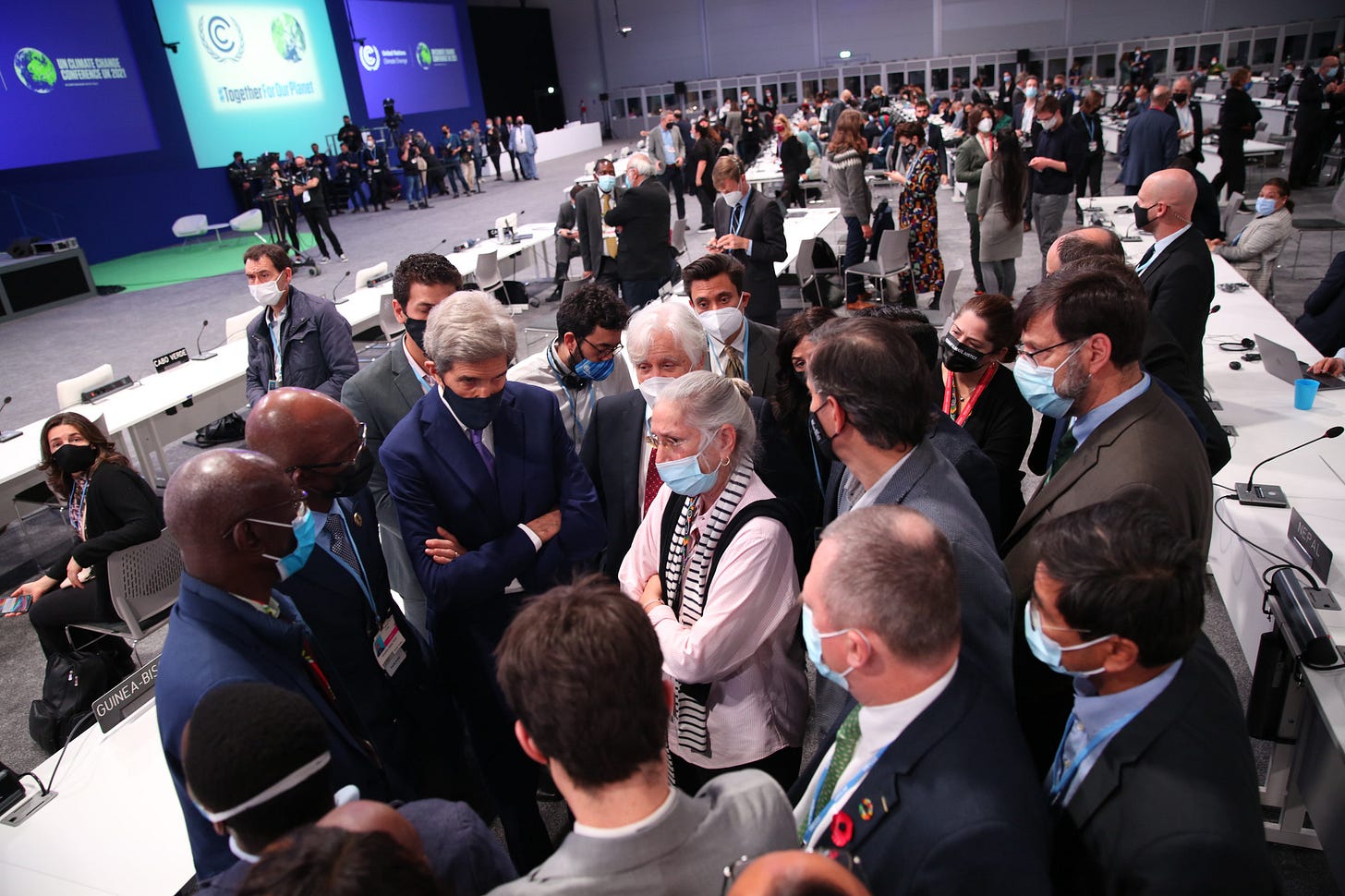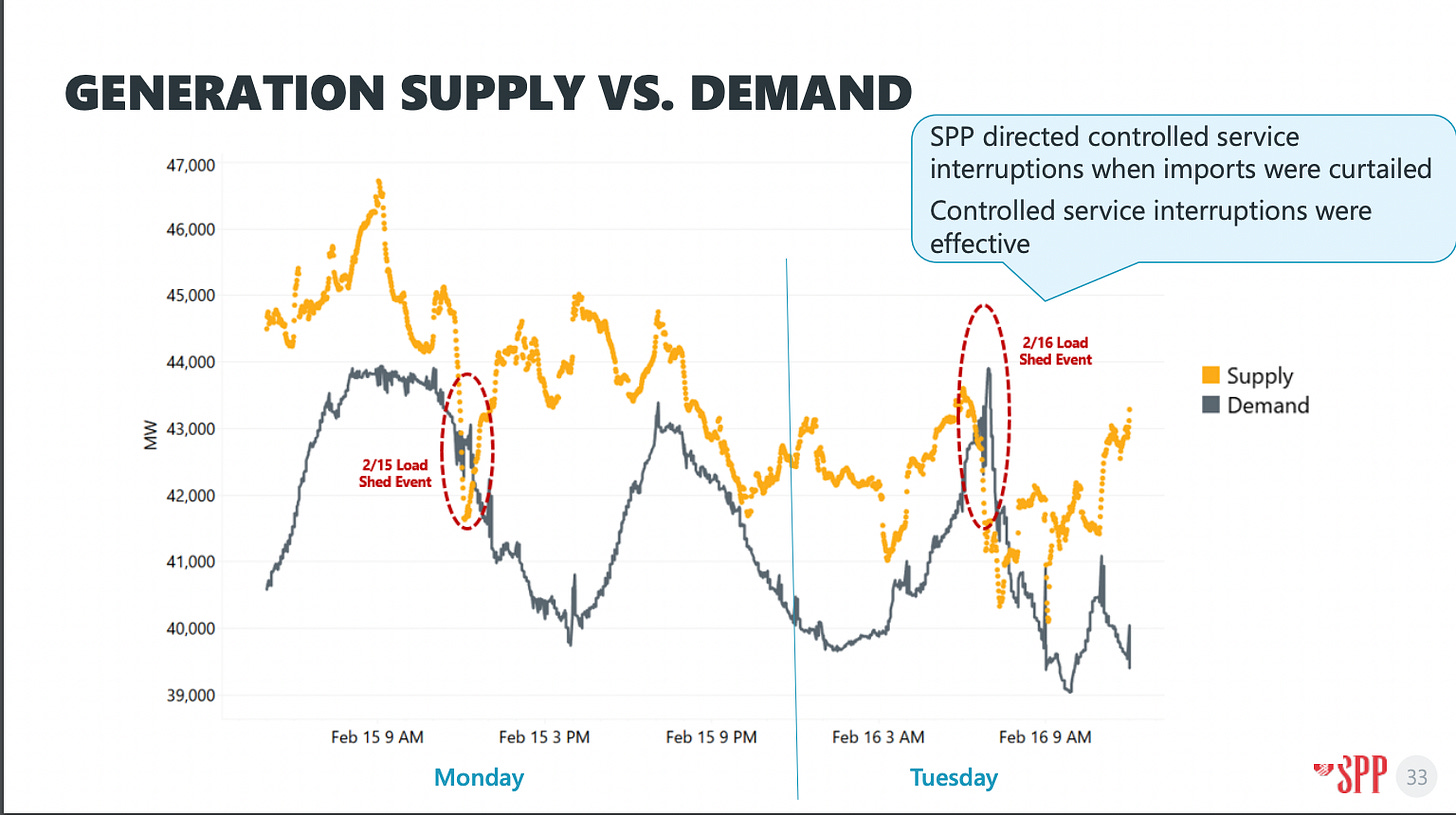Numlock Sunday: Alexander Kaufman on the anti-consumer playbook of natural gas
By Walt Hickey
Welcome to the Numlock Sunday edition.
This week, I spoke to Alexander Kaufman, who wrote Oklahoma Proposes Letting Gas Utility Charge A $1,400 ‘Exit Fee’ To Go Electric for HuffPost. Here's what I wrote about it:
Oklahoma Natural Gas owes a bunch of debt resulting from that deep freeze that sent prices soaring earlier this year. To pay for the $1.5 billion they owe over the next several decades — friends in the state legislature let the company convert that private debt to a public bond — they’re charging an extra $8 per month to most ratepayers per month every month for the next 25 years. Obviously that’s the kind of thing that may make ratepayers reconsider using the company’s services, as might a move away from natural gas usage in general amid a shift to green energy. That’s why Oklahoma Natural Gas and their state allies are weighting a $1,400 exit fee if anyone ever wants to leave their incredibly well-managed and obviously successful petrochemical tontine.
That’s wild! I had to know more.
We spoke about the recent COP26 conference and why the outcome left a whole lot to be desired, as well as what’s happening in Oklahoma and how it might lay the groundwork for more natural gas companies flexing political power to extract anti-consumer laws.
Kaufman can be found at HuffPost and on Twitter.
This interview has been condensed and edited.

All right, so Alex, thank you for coming back on. You've written a bunch of really cool posts about climate change-related topics, technology issues, and we'll get to those in a second, but we just came to the end of COP26, which was this big get-together of a lot of people from the world to talk about a big issue. What are your takeaways from it?
COP26 is, like all things, complicated. For those who don't already know, it is the big UN climate summit. It has happened almost every year for the past 26 years. It was skipped last year because of COVID restrictions, so this is actually the event that was supposed to take place last year. This one is notable and unlike many other COPs, in that COP21 in 2015 is what led to the brokering of The Paris Agreement, the first global pact that included the US and China and said carbon emissions are a problem, we have to cut them.
In that pact, there was a clause that said after five years, we have to come together and strengthen the goals and figure out how to not just halt warming at two degrees Celsius, or about 3.6 degrees Fahrenheit, above pre-industrial averages, but actually get it down to 1.5 degrees Celsius, or 2.7 degrees Fahrenheit, to prevent some really catastrophic things from happening.
This is the conference where that enhanced goal was supposed to be negotiated, and with that as the guiding light, it was a failure.

The collective pledges that were made by each country only amounted to — according to an analysis by the group Climate Action Tracker — only amounted to arresting warming at 2.4 degrees Celsius. So not only did it miss the 1.5 degree goal that we were supposed to be working toward here, but it actually blows past The Paris Agreement's lesser goal of two degrees. So in that sense, it was a failure.
One of the other main goals of this event was to raise the benchmark of money that had been set in 2015 to The Paris Agreement of $100 billion in financing per year to help the poor countries in the global south to adapt to climate change and to mitigate change, essentially giving them money to develop and help them to skip the dirty step of economic development that includes a lot of burning of coal and oil and gas.
In spite of all these pledges, in spite of the US coming to the table with a quadrupled figure from what it had previously pledged, that $100 billion per year number was not met, and so the effect of that in the final pact that came out of this conference was something that got watered down. It got watered down in part because China and India, the number one polluter and number three respectively, said, "You know what? We're not going to agree to phase out coal completely. We'll agree to phase it down, but we won't agree to phase it out completely, because the rich countries who have contributed the most to the cumulative mess of carbon in the atmosphere can't even agree on basic things like giving us the bare minimum of money to get past these certain phases of development and help us to adapt to the effects of climate change."
The good thing is that they agreed to come back next year and work towards strengthening those goals, four years earlier than they would have under The Paris Agreement. But as a set conference with specific goals, this utterly failed to meet the big ones.
Yeah, it sounds like a punt. It sounds like a lot of “we'll get this one next time.” Eventually you run out of next times, but it doesn't sound like it was a complete breakdown, it does sound like it was really just pushing actual decisions back a year.
That's about right. I mean, and it is notable, it's not as though we're a complete failure, in that the main event was figuring out these goals under The Paris Agreement, but that wasn't the only thing that happens when you have all of these world leaders and negotiators gathered in one place. So you actually had a lot of side deals that were made on the sidelines, that all of these things, the significance of them matters and how they're enforced and whether they are adhered to, but there were a bunch of little side deals that took place.
For example, the US got a bunch of countries to agree to dramatically cut emissions of methane, a super powerful greenhouse gas that traps more heat than carbon over a shorter period of time, but it dissipates more quickly than carbon in the atmosphere. You had six of the biggest automakers in many countries agreeing to phase out internal combustion engines by 2040. You had a big deal around ending deforestation by the end of this decade.
All of those things, again, it depends on how they're enforced, whether they're enforced, how flexible the criteria for enforcement seem to be, but they are nonetheless notable agreements and pledges to which these powerful polluters can be held accountable.
That's good stuff. So you've personally been on a tear lately, I've really enjoyed some of the work that you've been putting out. I think one story that I really, really enjoyed that you did was talking about the situation in Oklahoma and just how some of the material effects of climate change are actually starting to hit people in wallets. Can you talk about what's going on there?
Yeah, thank you, first of all. I'm always honored to be featured in the newsletter and moved that you enjoyed the stories. What's happening in Oklahoma is a pretty notable thing. I think to understand this, you got to go back to last February. We all remember the crazy cold snap that settled over the Southwestern United States in early February of 2021 and knocked out power, froze natural gas pipelines, and caused a huge calamity in Texas.
Oklahoma, neighboring Texas, experienced that as well, and what had happened is that as the price of natural gas skyrocketed, because the supply was down and there was so much demand, both for heating and for electricity, the big Oklahoma natural gas utility, conveniently named Oklahoma Natural Gas, went into chaos.
They needed to buy more supply, and the cost of natural gas was astronomically higher than it had been before the storm, and so in a last minute deal they got a big $1.5 billion credit line from Bank of America that allowed them to just buy enough actual gas to pump through pipes and heat people's homes. That debt that they took on is something that they don't really want on their books. They are a division of a publicly traded company called ONE Gas, big gas utility that's a regional giant based in Tulsa.
When you have that much debt on the books of a private company like that, it accrues different kinds of fees and interest, and it just isn't great for business. If you operate in a state like Oklahoma where the legislature and the governor's office is stacked with people who are quite friendly to the gas industry generally — Oklahoma's a big gas-producing state, so it's a pretty big part of the conservative political culture there — you can get some favorable things done in the legislature. That's what they did, actually.
Right at the moment when there were still people freezing to death in Oklahoma, they actually were able to rush a bill through the legislature that allowed the gas utility to securitize that debt. Which essentially means that they could take it off their books and move it into municipal bonds that they could pay back over a longer period of time. Essentially they socialized the debt that they had to take on to fuel everybody's homes.
The deal about how that securitization is going to work, how they are essentially going to adhere to this law that they got passed — that deal is what is being negotiated right now before the State Regulatory Commission. As part of that deal, they want to sell these bonds to investors on the bond market and the guaranteed ability to repay those bond holders over time comes from the fact that this gas utility can say, "Well, we're always going to have customers that are buying from us and paying utility rates to us. Therefore, this is a good high-quality, low-risk investment, and you will get your money back on it."
Now, the big question there is whether that's true. I mean, we're living through a moment when climate policy is making the shift away from natural gas imperative, when the evolution of technologies like heat pumps and induction stoves and other types of electrical applications and appliances are just getting better and better. The number of people across the country ending up with new homes across the country that are going all electric rather than hooking up to gas is steadily on the rise. If you have the right kinds of climate policies ultimately put in place, that shift will only accelerate.
Understanding that risk, the Oklahoma Regulatory Commission staff member on it actually proposed a small fix which was meant to allay the concerns of investors who wouldn't want to see their bonds become less profitable if there are fewer people actually paying rates to this utility. That was to add in a termination fee, basically a charge, whereby if you want to cut off gas service — not because you're moving out of the state, but because you are going to get rid of your gas stove, get rid of your gas furnace and get an electric heat pump and get an electric stove — if you do that, you have to basically pay out a portion of the debt.
In the initial proposal, it could total almost $1,400. It was an almost $1,400 exit fee to people just to get out of the gas system. That's an expense that they would have to incur on top of the expenses of buying the actual new electric appliances and going through all these other steps, which have huge benefits to the climate and have huge benefits to people's health. There's a lot of ambient air pollution that is created by gas stoves, for example, and all these other things. A myriad of other reasons that someone may choose to do those things, and they were putting up a toll essentially to disincentivize that from taking place. That policy is what the story was about, and that's what's being actively debated right now before the Oklahoma Corporation Commission.
It's just shocking that an oil and gas company would seek to socialize the problems and privatize the gains.
Yeah, very novel business model for that industry.
Absolutely shocking. I mean, it is a really fascinating intersection of how things kind of work, how companies are able to continue maintaining a grip on their business models by applying forces of political pressure. It's really just got everything. So, is it a sealed deal yet? Can you kind of go into where it's at right now and what the next situation could be?
I wouldn't want to confuse people, it is an all but sealed deal. It is not presently yet, but all four parties to the settlement are in favor of this unanimously. What happens next is this Monday, tomorrow, it will go before an administrative judge in the Oklahoma Corporation Commission. That judge will decide whether or not to approve the settlement that was proposed by both the public utility division of the Oklahoma Corporation Commission, the actual gas utility itself and a handful of other parties.
They will have a public comment period where you can expect that there will be some of the usual suspects raising the alarm over this. You'll probably get AARP, which tends to make a stink over things like this, and the Sierra Club has been out front raising awareness about this and criticizing it. It is notable according to these groups that they don't feel like they were given ample ability to contest this from the start, because this specific fee in the settlement was not part of the initial application proposal that the gas utility put forward; it was added later on in the process after the kind of initial opportunities for public comment had already happened.
But there will be this comment period tomorrow, in all likelihood the judge will rubber stamp the settlement and then it will go to the Oklahoma Corporation Commission for final approval. Once it gets approved, it could be as late as this coming June when customers will start seeing the additional charges to help pay down this debt appear on their bills, and when customers who are switching to electric appliances could be subject to that termination fee.
I feel like it's a notable additional piece of context in this that I neglected to share before is why this really matters, this thing that's taking place in Oklahoma.
The reason that it matters is that despite the very specific circumstances that have led to its policies proposal in this very fossil fuel-friendly state, there is a nationwide fight right now by gas utilities against the electrification. I mean, this is an existential issue for them.
You've seen policies that appear in one state be rapidly replicated in others. Oklahoma in 2019 was one of the very first states to enact a ban on its cities banning new natural gas hookups in buildings. This is a policy that the city of Berkeley, California, did first. It has been adopted in many other cities since, including Seattle, Brookline, Massachusetts and San Francisco. It essentially says if you build a new building, or in some cases renovate one, you can't hook up to natural gas, you have to make it an electric building.
That policy is now kind of proliferating in many places. Seeing that, states like Oklahoma and almost two dozen other mostly Republican-controlled states said, "Nuh-uh, our liberal cities are not banning natural gas," and they passed what are called preemption laws, a ban on the ban. These are quite popular, and you're seeing the country become bifurcated in this way between states that are allowing their cities to mandate electrification in new buildings and states that are not.
The fear among a lot of advocates is that this novel policy in Oklahoma will become another tool in that same toolbox, that you will quickly see other gas utilities in other states advocating similar types of policies in those states to further disincentivize the transition away from gas.
Yeah, that seems to be a problem, just because there are a lot of states where the legislatures are kind of hook, line and sinker for this it seems.
Big time. I mean, these tend to be pretty entrenched interests, they tend to be big donors. It's a pocketbook issue for people, but it's also one that can be a little bit boring, and it's one that the gas industry has been able to successfully pull into the culture wars, in the sense that amid their push for these preemption laws in many states, you have gas utilities also launching massive advertising campaigns. Not just gas utilities, but gas producers. Those advertising campaigns come in the form of Instagram influencers. Some of your readers may have seen these ads before, where it'll be a hot young Instagram chef proudly cooking with gas and smiling about how happy they are to be doing so.
Similarly, according to Rebecca Leber's reporting at Mother Jones, you had people showing up in the app Nextdoor, the kind of local community app Nextdoor, and being like, "Hey folks, isn't it so wacky that anybody would want to move away from natural gas? I mean, I sure do love my dang gas stove."
Oh, no.
That person ended up being someone who was being paid by a gas utility to say those things and post those things. So there is kind of active cultivation of public opinion here, not just the kind of backdoor dealings with friendly and ideologically pro-fossil fuel legislators.
Well, that seems as good a place as any to finish on. I guess if people wanted to get correct information about how natural gas can affect the environment and these transitions happen, where can you be found, Alex?
I can be found on huffpost.com, I can also be found at @AlexCKaufman on Twitter. While I do not update it as frequently as I really should, I do have a Substack where I do post some of my stories on this sometimes, which the link to that is just my last name, kaufman.substack.com.
If you have anything you’d like to see in this Sunday special, shoot me an email. Comment below! Thanks for reading, and thanks so much for supporting Numlock.
Thank you so much for becoming a paid subscriber!
Send links to me on Twitter at @WaltHickey or email me with numbers, tips, or feedback at walt@numlock.news.










